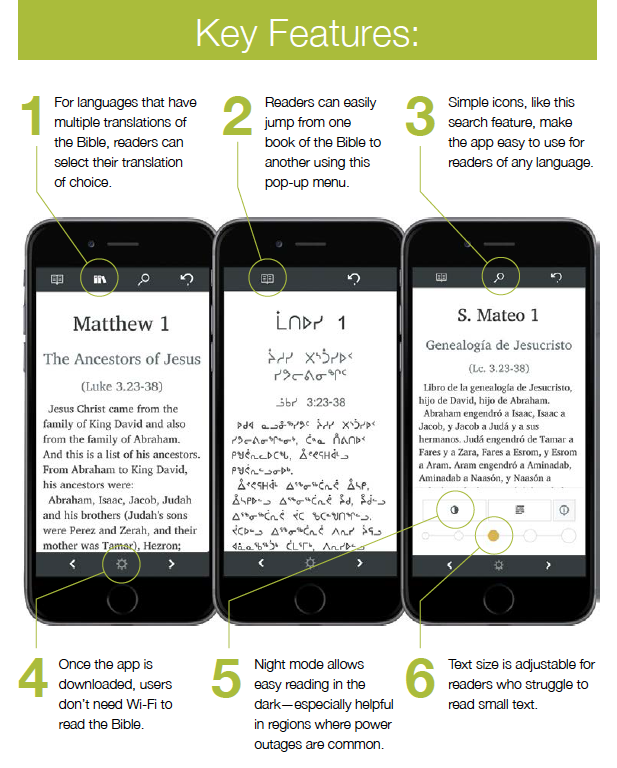Arfon Jones saw something strange as he biked along narrow lanes in the lush countryside of Wales. The Welsh landscape, normally speckled with green trees and white sheep, displayed an enormous pink tent—like a circus big top. But the huge pink pavilion hardly surprised Jones. In fact, he had been looking for it. He smiled, parked his bike and entered the tent.
Inside, the tent teemed with life. Thousands of people bustled about, chatting in Welsh. Choral music, folk dances and fragrant food bombarded Jones’ senses from all directions. He soaked in the sights and smells of the Eisteddfod, the largest Welsh cultural festival of the year.
Every August, Welsh speakers bring poetry, art and songs to perform at the Eisteddfod. This year, Jones brought a very special gift to share with his countrymen—the Word of God in their native tongue.
Jones had joined the festival to promote a new Welsh Bible mobile app called ap beibl. The app features three Welsh Bible translations, including a contemporary version Jones had been translating for 20 years. While the app is a revolutionary new way for Welsh speakers to engage with Scripture, its genius will impact the ends of the earth. The groundbreaking technology behind ap beibl will bring the Bible to unreached people groups around the world faster than ever.
“In all likelihood, more people on the planet own a mobile phone than a toothbrush,” explains John Mark Mitchell, director of digital innovation for American Bible Society. “People in the far reaches of the Amazon, and other remote places on earth, will soon have access to these cellular technologies.”
For Mitchell and his team, this digital renaissance is the opportunity of a lifetime. “As people whose mother tongue is not English go online and search ‘Bible,’ what are they going to find?” asks Mitchell, “Is the Bible going to be accessible to them in their heart language?”
“In all likelihood, more people on the planet own a mobile phone than a toothbrush.” —John Mark Mitchell
To answer this critical question, Mitchell’s team piloted a new digital tool that made possible the creation of ap beibl. It’s called the Global Bible Reader—an advanced computer program that publishes easy-to-use Bible apps for unreached parts of the world, as it did in Wales. Because the program is compatible with any global Bible translation, it answers another one of Mitchell’s big questions: Is it possible for a single computer program to generate Bible apps in any of the world’s 7,000 languages?
With the Global Bible Reader, developers won’t have to start from scratch every time they create a Bible app in a new language. Instead they can just load a completed Bible translation into the Global Bible Reader and a newly formed Bible app is ready for people awaiting Scripture in their heart language.

But the Global Bible Reader doesn’t just make life easy for app developers; it makes reading the Bible easy for speakers of minority languages around the world. “Most Bible apps available today publish their user interface in English or some other global trade language,” says Mitchell, quick to add that capable ministry partners like YouVersion® fill a massive need in the digital Bible marketplace. But if a person doesn’t know one of the major trade languages, they can’t use all of the great Bible apps on the market today.
And Mitchell’s team understands that efficiently churning out Bible apps won’t matter if indigenous people groups around the world don’t actually read those digital Bibles. One Bible translator in Indonesia shared precisely this fear. “He is very worried that the translation will be completed but sit on a ‘digital bookshelf ’ when it’s done,” relates Mitchell.
To address this, apps generated with the Global Bible Reader feature a menu comprised of pictures instead of words. “The whole user interface is iconographic,” explains Mitchell, “We don’t need someone to translate the user interface for each translation.”
This means that Bible readers from every corner of the world can intuitively jump between Bible translations, save reading history, search by chapter or verse and enter night reading mode, in which text gets illuminated for easier reading in dark places. To top it off, users don’t need a Wi-Fi connection once the app is on their phone. “This [app] is so simple to use, I would say anybody can use it,” Jones says.
Thanks to support from American Bible Society’s financial partners, this easy-to-use Bible app is ready to roll out in more than 100 world languages over the next 12 months. But Mitchell prays that this is only the beginning, “There are thousands of languages we could be producing this app in…we are looking for where the global need is the greatest.”
And Jones understands that this great opportunity leads far beyond a pink festival tent in Wales. “I would absolutely love to see this app used as widely as possible, among as many minority languages as possible,” he says. Jones is excited to know that this digital Bible will soon touch corners of Africa, Asia and South America thirsty for God’s lifechanging Word.
After all, Jones’ dream for Wales is the same as Mitchell’s hope for the world. As Jones puts it, “We want to see as many people as possible read the Bible.”





